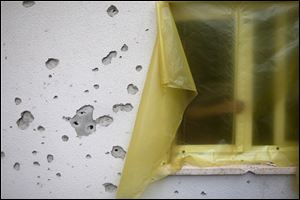
VIOLENCE IN MIDEAST
Israel fires warning into Syria
Military post near borderhit by stray mortar shell
11/12/2012
Mortar shell marks are seen on a wall as a person closes a broken window of his house in a community along the Israel Gaza border, Israel, Sunday, Nov. 11, 2012. Israel's prime minister says his country is ready to strike harder against Gaza Strip militants if they don't stop attacking the Jewish state. Hostilities escalated sharply over the weekend, as militants fired rocket salvos from Gaza and Israeli strikes killed six Palestinians. (AP Photo/Ariel Schalit)
JERUSALEM — Even as Syrian anti-government groups reached a deal to form a new leadership organization, Israel was drawn into the Syrian civil war for the first time Sunday.
Israeli troops fired warning shots into neighboring Syria after a stray mortar shell from across the border hit an Israeli military post.
Israeli military officials said the mortar fire caused no injuries or damage at the post in the Golan Heights, which Israel captured from Syria in the 1967 Mideast war and then annexed.
But errant fire has multiplied, leading Israel to warn it holds Syria responsible.
“A short while ago, a mortar shell targeted an IDF [Israel Defense Forces] post in the Golan Heights,” Lt. Col. Avital Leibovich said. “We answered with a warning shot toward Syrian areas. We understand this was a mistake and was not meant to target Israel and then that is why we fired a warning shot in retaliation.”
Israel returned fire with an anti-tank missile.
The Israeli military said it filed a complaint through U.N. forces in the area.
Nineteen months of fighting and chaos engulfing Syrian President Bashar Assad has spilled across borders with Lebanon, Turkey, and Jordan. The danger of drawing in Israel into a wider regional conflagration is one of the worst-case scenarios.
Israel worries Syria’s civil war could spill across into the Golan — a concern made more immediate by multiple recent cases of errant fire and Israel’s claim that three Syrian tanks entered the demilitarized zone on the plateau this month for the first time in 40 years.
Israeli officials do not see Assad trying to intentionally draw Israel into the fighting, but they have raised the possibility of his targeting Israel in an act of desperation.
Israel Prime Minister Benjamin Netanyahu told his cabinet Israel is “closely monitoring” the border with Syria and is “ready for any development.”
Israel and other nations fear that if Assad’s regime is toppled, the country could fall into the hands of Islamic extremists or descend into sectarian warfare, destabilizing the region.
Israeli officials also fear Syria’s arsenal of chemical weapons and missiles could fall into the hands of its Lebanese ally, the Hezbollah guerrilla group, or other anti-Israel militants if Assad loses power.
In Qatar, Syrian opposition factions signed a tentative deal Sunday to create an umbrella group that could pave the way for international diplomatic recognition, plus more financing and military aid from foreign capitals.
After three days of haggling, opposition negotiators agreed to the new coalition and elected as its president Maath al-Khatib, the former Islamic preacher of the historic Ummayad mosque in Damascus and a respected national figure within Syria.
“Today in Doha is the first time the different factions of the Syrian opposition are united in one body,” said Riad Farid Hijab, a former Syrian prime minister and the highest-level defector from the Damascus government. “So we ask the international community to recognize the Syrian opposition as the representative of the Syrians.”
The umbrella group was meant to subsume the Syrian National Council, an earlier try at unification that has appeared increasingly marginalized as Syria has fallen into civil war.
The council’s authority was undercut when it failed to draw sizable support from key minorities, religious and tribal figures, businessmen — and most important, rebel units fighting Assad’s forces.
The hope in the West is that the new coalition — the National Coalition of Syrian Revolutionary and Opposition Forces — can establish itself and give local opposition councils the legitimacy to bring fighters under their authority.
A key change is that revolutionary councils from 14 Syrian provinces each have a representative, though not all live in Syria. The hope is that will bind the coalition to those inside the country.
In addition, perhaps the most important body the new group is expected to form is a Revolutionary Military Council, to oversee the splintered fighting groups and to funnel lethal and nonlethal military aid to the rebels.
It should unite units of the Free Syrian Army, various militias and brigades in each city, and large groups of defectors.
Before the ink was dry on the last draft, negotiators hoped that it would bring them the anti-aircraft missiles they crave to take on Syria’s lethal air force. Both the United States and Britain have offered only nonmilitary aid to the uprising.
A similar attempt by the Syrian National Council to supervise the military never jelled. Organizers said financing was too haphazard.
Eventually foreign governments such as Qatar and Saudi Arabia, both of which are financing and arming the rebels, found their own favorite factions to deal with.
Foreign leaders — notably including U.S. Secretary of State Hillary Clinton — urged this unification largely so they could coordinate their efforts and aid through a group of technocrats. Once the coalition gets global recognition, it is supposed to set up a temporary government.
Burhan Ghalioun, the old Syrian National Council’s former leader, praised the coalition as vital toward getting the world more involved and Mr. al-Khatib as an important rallying figure. “He’s a national figure and symbol since the beginning of the revolution.”
Elected as vice presidents were Riad Seif, 66, a Syrian businessman and dissident who organized the unification effort, and Suheir Atassi, descendant of a noted political family and a woman who held one of the last open political talk groups in Damascus.